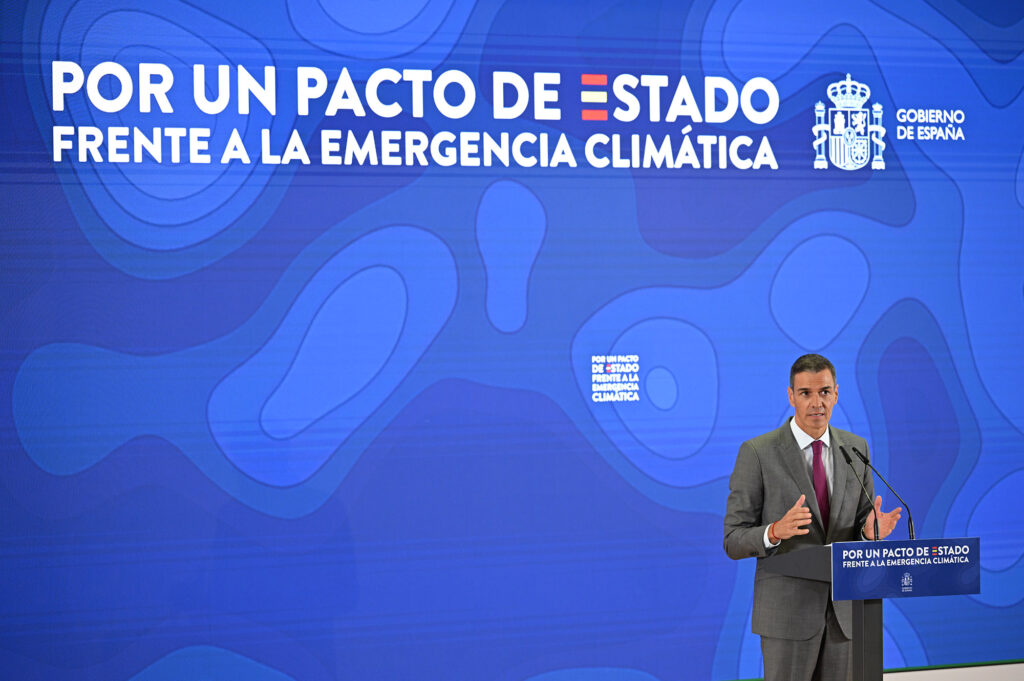Europe can’t afford to delay a sustainable food system
Spain demonstrates the cost of climate inaction – and the urgent need for Europe to invest in protein diversification.
Este artículo también está disponible en español.
21 November 2025

This year’s COP30 discussions took place against the backdrop of UN Secretary General António Guterres’s prediction that the world will not be able to keep global heating below the Paris Agreement’s 1.5C target.
The Spanish government travelled to the Brazilian city of Belém to issue a stark reminder that Europeans don’t need to look as far as the Amazon to see the impact of climate change. President Pedro Sánchez highlighted that the cost of climate inaction far exceeds that of investing in solutions, with climate change having claimed 20,000 Spanish lives over the last five years.
But despite this warning, one crucial element of Spain’s response remained overlooked – just as it was missing from most global discussions about the roadmap to a safer climate.
Research by Oxford University has found that the world cannot meet Paris Agreement targets without shifting away from conventional animal agriculture, a food production system that causes 20% of global greenhouse gas emissions – equivalent to all the planes, trucks, cars, trains and ships on Earth.
In Europe, meat consumption has stabilised at a high level, with Europeans consuming almost double the global average per capita, while across the world, we face an unsustainable situation as demand for meat is projected to grow by at least 52% by 2050.
Alternative proteins: a high-impact, overlooked solution
A delegation from the Good Food Institute (GFI) also travelled to Belém to highlight the importance of plant-based foods, cultivated meat and fermentation-made ingredients in supporting more sustainable diets.
As GFI’s president and founder Bruce Friedrich said during his address to COP30’s Asia Climate Solutions Pavilion: “A shift in trajectory is urgently needed. Not by begging consumers to stop eating meat, but by upgrading the way meat is made.”
These products can deliver the foods people know and love at a fraction of the environmental cost.
If 8% of the global protein market was made up of alternative proteins by 2030, we could see a reduction of 0.85 Gt of CO2e worldwide by 2030 – equivalent to decarbonising 95% of the aviation industry. Meanwhile, a systematic review conducted last year found that existing plant-based meat products consistently have a fraction of the environmental impacts of conventional meat, causing 86-94% fewer greenhouse gas emissions. Peer-reviewed research suggests cultivated meat could cut the climate impact of meat by up to 92%.
Lessons from Spain’s climate strain
Spain’s experience over the past year highlights why food system transformation is urgently needed. Still reeling from the devastation of flooding in 2024, which killed more than 200 people, an unusually rainy spring spiralled into yet more torrential downpours, overwhelming drainage systems, turning streets into rivers and washing away vehicles.
A University of Mannheim study estimated that extreme weather across Europe will cause €12.2 billion in economic losses by the end of 2025 – rising to €34.8 billion within just four years.
By June, Spain was already facing its first major heatwave of the year, breaking historical temperature records. According to Spain’s mortality monitoring system, heat-related deaths rose by 1,300% compared with 2024. The UN Convention to Combat Desertification (UNCCD) has identified Spain as one of the European countries most vulnerable to drought and extreme heat.

Despite the spring rains, wildfires continue to devastate ecosystems and rural livelihoods. In 2025, Spain accounted for more than 66% of the total area burned by wildfires in the EU – 382,000 hectares, an 800% increase from 2024. And the European Commission’s previous estimate of €71.6 billion in wildfire-related economic losses predates the record-breaking fires of 2023 and 2025.
Spain is not alone. Estimates published earlier this year found that extreme weather costs EU farmers around €28 billion per year.
From COP30 to Spain’s National Climate Pact
In response to these impacts, the Spanish government has proposed a National Pact on the Climate Emergency, aiming to strengthen preparedness for future climate shocks. GFI Europe contributed to the public consultation, highlighting the transformative role alternative proteins can play in helping Spain meet climate goals.

These plans should aim to diversify sources of tasty, nutritious, and affordable protein, make space for more sustainable farming practices, and reduce the current dependence on intensive production systems.
Spain has a unique opportunity to become southern Europe’s leader in alternative proteins, strengthening resilience, protecting natural resources, and opening new opportunities for sustainable economic growth. Our recent report explores the rapidly evolving landscape of alternative proteins in Spain and offers key recommendations to build on this early momentum.
Yet alternative proteins were missing from Spain’s climate plans, despite being recognised as one of the most important agrifood trends in the recent National Food Strategy.
Investment lags behind other technologies
Spain’s situation mirrors a global trend – despite their potential to slash emissions, investment in alternative proteins still lags far behind other green technologies, like electric vehicles, and their role continues to be largely overlooked at major climate conferences.
GFI APAC CEO Mirte Gosker reiterated this point when she addressed climate leaders from Brazil, Singapore, China and the United States at COP30, highlighting that, although food and agriculture account for one-third of all global emissions, the sector has received less than 5% of climate financing.
The benefits of diversifying our protein supply extend beyond reducing emissions. Because they require up to 90% less land than beef, alternative proteins could ease pressure on ecosystems and virtually halt deforestation if adopted at scale, unlocking enormous gains for nature.
They can strengthen global food security by delivering equivalent amounts of protein with fewer resources, reducing strain on freshwater systems and increasing the resilience of supply chains. With significant public investment, research suggests protein diversification could add over €900 billion to the global economy and create 10 million jobs by 2050. And because they’re lower in saturated fats and don’t rely on antibiotics, they could help to address public health challenges.
To have any chance of realising these benefits, governments across Europe need to invest in alternative protein research, support farmers in growing local ingredients, and incentivise companies to scale up production and make sustainable options accessible to all.
Plant-based, cultivated, and fermentation-made proteins could be the bridge Europe needs – a space where governments, farmers, and industry can work together to build a food system that meets the Paris Agreement and is resilient to climate impacts. The cost of failing to do so is unthinkable.

 Public Affairs Manager, Spain
Public Affairs Manager, Spain